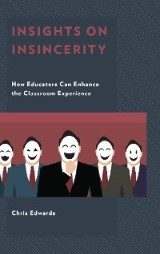Details

Insights on Insincerity
How Educators Can Enhance the Classroom Experience|
27,99 € |
|
| Verlag: | Rowman & Littlefield Publishers |
| Format: | EPUB |
| Veröffentl.: | 14.03.2018 |
| ISBN/EAN: | 9781475841732 |
| Sprache: | englisch |
| Anzahl Seiten: | 128 |
DRM-geschütztes eBook, Sie benötigen z.B. Adobe Digital Editions und eine Adobe ID zum Lesen.
Beschreibungen
<span><span>Erasmus praised folly and the Romantics waxed poetically about love, but no one until now has traced the history and impact of insincerity on society and the humanities. Insincerity arises when someone feels one way but acts another and an insincere situation looks to have one purpose but really hides another. Insincerity finds expression in four types of relationships: 1. From authority to the subordinate, 2. From the subordinate to authority, 3. Between equals 4. In society and in the self. Educators can discover how highlight insincerity in literature, history, psychology, sociology, politics, and popular culture. All readers can learn how to identify insincerity in their everyday relationships. Was that meeting at work really about conveying information and soliciting responses, or was it really about reinforcing the corporate hierarchy? When Galileo apologized to the Inquisition for positing a “solar” system, did he bring an end to an era of great religious sincerity? What did George Orwell get so wrong about insincerity in </span><span>1984</span><span>? Most importantly, readers can find out what they should do when they you encounter that modern phrase that manifests insincerity: </span><span>Thanks so much for your feedback</span><span>.</span></span>
<span><span>Insights on Insincerity </span><span>analyzes the concept of insincerity thematically through four types of relationships: from authority to the subordinate, the subordinate to authority, among equals, and in the self and society. Through this, references to classical literature, history, psychology, sociology, and popular culture are examined and analyzed. </span></span>
<span><span>Preface</span></span>
<br>
<span><span>Acknowledgements</span></span>
<br>
<span><span>Introduction</span></span>
<br>
<span><span>Chapter One: Insincerity from Authority</span></span>
<br>
<span><span>Chapter Two: Insincerity from the Subordinate</span></span>
<br>
<span><span>Chapter Three: Insincerity among Equals</span></span>
<br>
<span><span>Chapter Four: Insincerity in Society and with the Self</span></span>
<br>
<span><span>Conclusion</span></span>
<br>
<span><span>References</span></span>
<br>
<span><span>About the Author</span></span>
<br>
<span></span>
<br>
<span><span>Acknowledgements</span></span>
<br>
<span><span>Introduction</span></span>
<br>
<span><span>Chapter One: Insincerity from Authority</span></span>
<br>
<span><span>Chapter Two: Insincerity from the Subordinate</span></span>
<br>
<span><span>Chapter Three: Insincerity among Equals</span></span>
<br>
<span><span>Chapter Four: Insincerity in Society and with the Self</span></span>
<br>
<span><span>Conclusion</span></span>
<br>
<span><span>References</span></span>
<br>
<span><span>About the Author</span></span>
<br>
<span></span>
<span><span>Dr. Chris Edwards</span><span> is a public-school teacher in the Midwest, and the author of numerous books on science, philosophy, and educational theory. He directs a summer institute for math and science teachers, is a frequent contributor to </span><span>Skeptic </span><span>magazine, and has presented his teaching methodology nationally through publications and presentations through the </span><span>National Council for Social Studies</span><span>. </span></span>


















